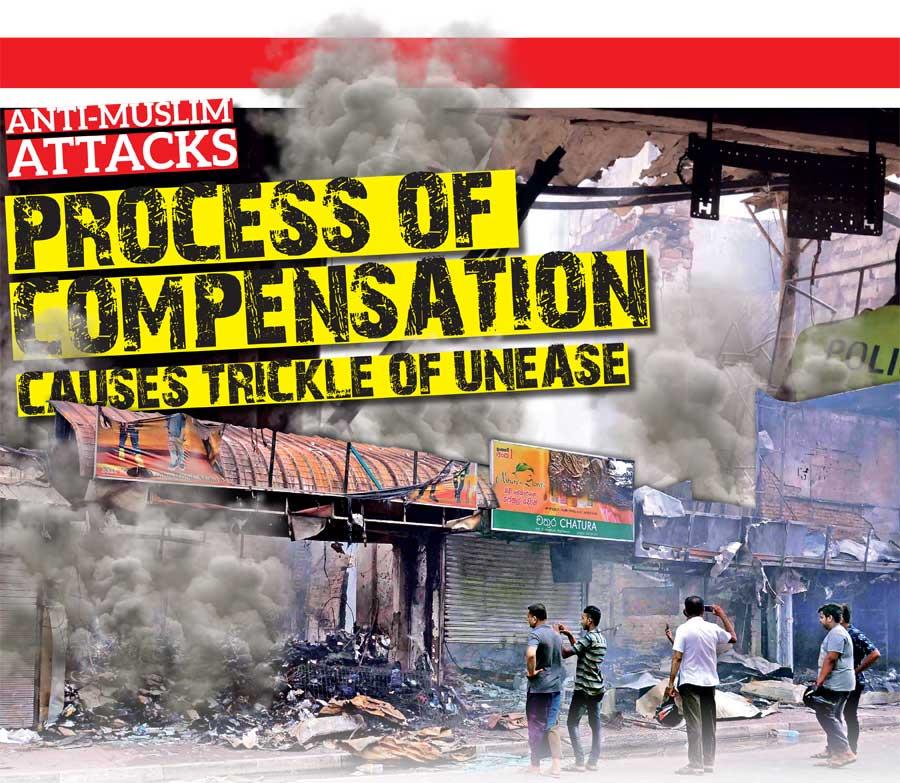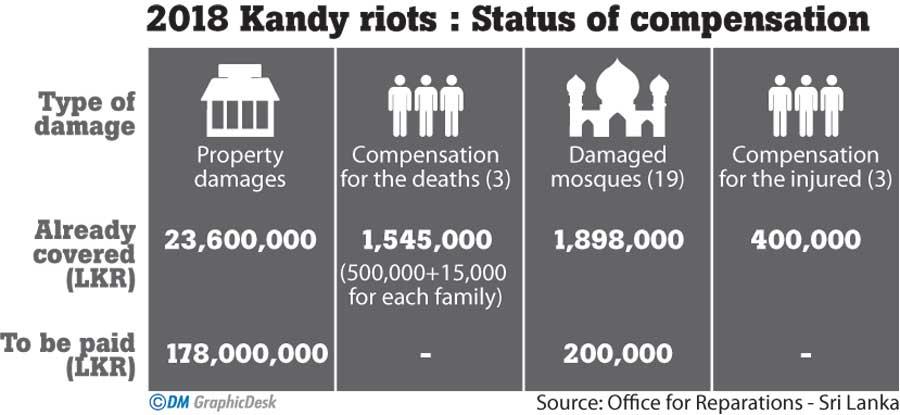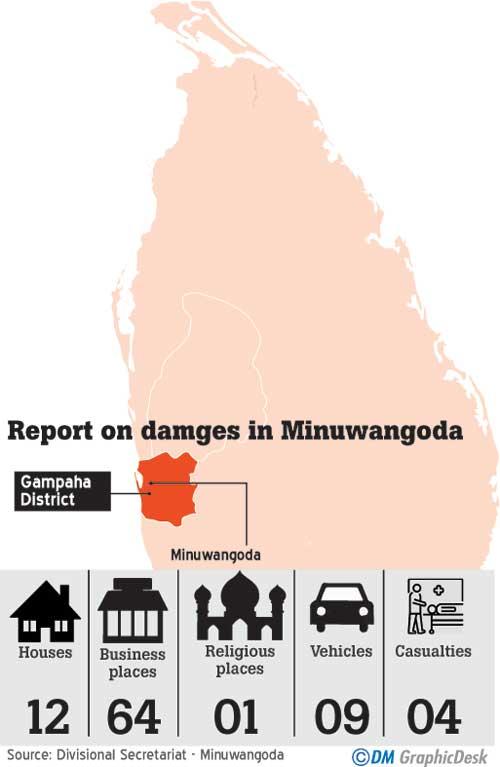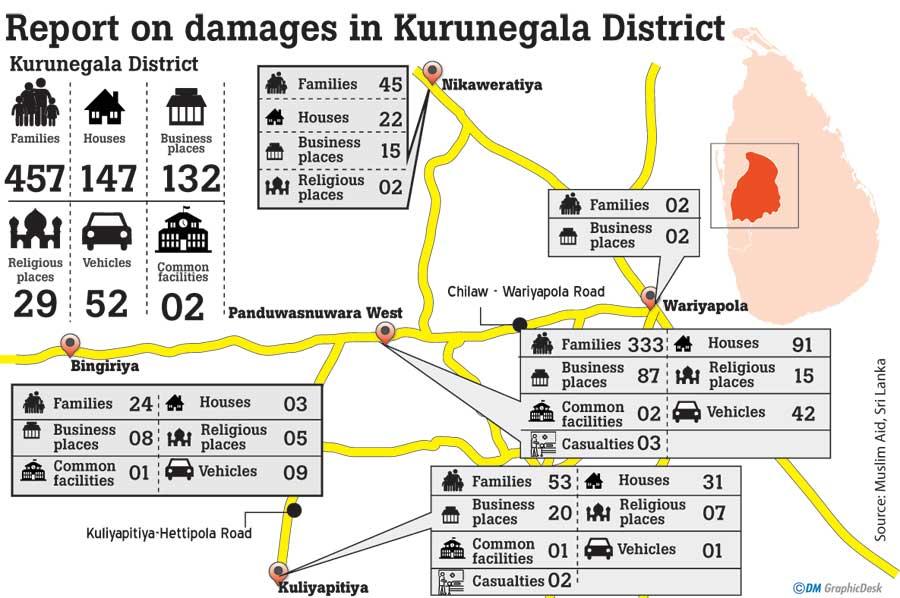Reply To:
Name - Reply Comment

INGO calculates colossal damage
Govt. struggling to figure out the losses
Violence inflamed by racism and extremism make the individual and the society as a whole incur heavy costs. Despite Sri Lanka, having learned through unpleasant  experiences relating to inter-community violence since at least the late 19th century, the country is still witnessing increasing ethno-religious tensions. Ethnic riots in Sri Lanka have resulted in tangible costs to the country with regard to medical and mental health care expenses, lost productivity, property damage of victims and in intangible costs because of reduced quality of life, pain, and suffering of the affected communities. Marking another black day in the history of Sri Lanka, the organised mob attacks were reported in Kurunegala and Gampaha districts on May 13 in a brutal retaliation over the alleged involvement of the ISIS terrorists and a group of local extremist Muslims in the Easter Sunday attacks.
experiences relating to inter-community violence since at least the late 19th century, the country is still witnessing increasing ethno-religious tensions. Ethnic riots in Sri Lanka have resulted in tangible costs to the country with regard to medical and mental health care expenses, lost productivity, property damage of victims and in intangible costs because of reduced quality of life, pain, and suffering of the affected communities. Marking another black day in the history of Sri Lanka, the organised mob attacks were reported in Kurunegala and Gampaha districts on May 13 in a brutal retaliation over the alleged involvement of the ISIS terrorists and a group of local extremist Muslims in the Easter Sunday attacks.
For the Sri Lankan Muslim community – less than 10% of the population – this isn’t the first time they have had to deal with such a hostile backlash. In March last year, the ugly head of racism rose its head in the sacred city of Kandy following a death of a 41-year-old father of two, who succumbed to head injuries sustained during an assault.
Since the two parties involved in the incident were from two different communities – Buddhists and Muslims- subsequently, the incident turned into a widespread communal clash. Reprisal attacks, which triggered off on March 5, set Digana and Teldeniya ablaze and continued in several other areas in Kandy. Dozens of shops were burnt down and a number of houses and religious places was vandalized causing colossal damage.
Following the attack, four Ministries - the Ministry of Buddha Sasana, Ministry of Posts and Muslim Religious Affairs, Ministry of Rehabilitation and Resettlement and the ministry of Disaster Management -- were involved in the payment of compensation towards damages caused during the unrest in Kandy. This was in keeping with a decision made by the Government on the instructions of Prime Minister Ranil Wickremesinghe. The Premier had directed that all properties damaged should be fully rehabilitated within four months.
Even after one year and two months the compensation process hasn’t been completed. Refer to info-graphic 01 which underscores how the Government’s compensation process for damages of the 2018 Kandy riots have been carried out so far.
Graphic 01

 The Divisional Secretary of Minuwangoda Lakmini Kulathilake told the Daily Mirror that the first phase of data gathering in Minuwangoda area was complete. Application forms for the victims have been distributed by the DS office to access the losses incurred to their own shops and houses. As the next step, officers of the DS office would make field visits to the areas and finalise the assessments to be forwarded for the compensation process.
The Divisional Secretary of Minuwangoda Lakmini Kulathilake told the Daily Mirror that the first phase of data gathering in Minuwangoda area was complete. Application forms for the victims have been distributed by the DS office to access the losses incurred to their own shops and houses. As the next step, officers of the DS office would make field visits to the areas and finalise the assessments to be forwarded for the compensation process.
Info-graphic 02 shows data collected by the Divisional Secretariat of the Minuwangoda over the damages reported in the Minuwangoda area.
The Kurunegala District Secretariat’s Office which is responsible to gather information on the damages reported in divisional secretariat divisions including Panduwasnuwara West, Nikkaraweratiya, Wariyapola, Bingiriya and Kuliyapitiya, which came under attack on May 13, has still not finished its data gathering process. Therefore, the DS/ Government Agent Gamini Ilangarathna was not willing to release the information gathered by them so far citing that the data is yet to be finalsed.
Ethnic riots in Sri Lanka have resulted in tangible costs to the country
The Daily Mirror, is in the possession of the data regarding the damages reported in the entire Kurunegala district and collected by the Sri Lankan office of a UK based Islamic charity NGO -- Muslim Aid. Kurunegala DS Office, Government Valuation Department is also still in the process of estimating the damages to approve compensation process. Refer to info-graphic 03.
Graphic 03

Sri Lanka Police was not able to present detailed and updated data regarding the damages taken place on May 13 of the anti-Muslim attacks reported in Kurunegala and Gampaha districts. When asked, Police Spokesman SP Ruwan Gunasekara said he was not in possession of a detailed report of even the number of arrests made so far by the police over the recent anti-Muslim riots.
When the Daily Mirror asked Police Spokesmen and Attorney-at-law Gunasekara regarding the legal actions that could be taken by the victims against the culprits of the organised mob attacks, he said the victims can opt for civil action in court, in which case the court decides on both the criminal aspects of the case and the civil aspects. If convicted, the defendants will be made to award compensation to the victims. Compensation of the victims will, however, only be granted if the procedural and substantive conditions for such compensation are fulfilled.
Sociologist Prof. Siri Hettige opined that the continuation of such violence can be disastrous for a country that is beset with too many not so easily resolvable issues such as unprecedented political instability and uncertainty, massive indebtedness and challenges emanating from climate change. Further, he emphasised that policy reforms should be brought about in areas that have a direct bearing on the identity formation and inter-community relations including education, media, language and religion.